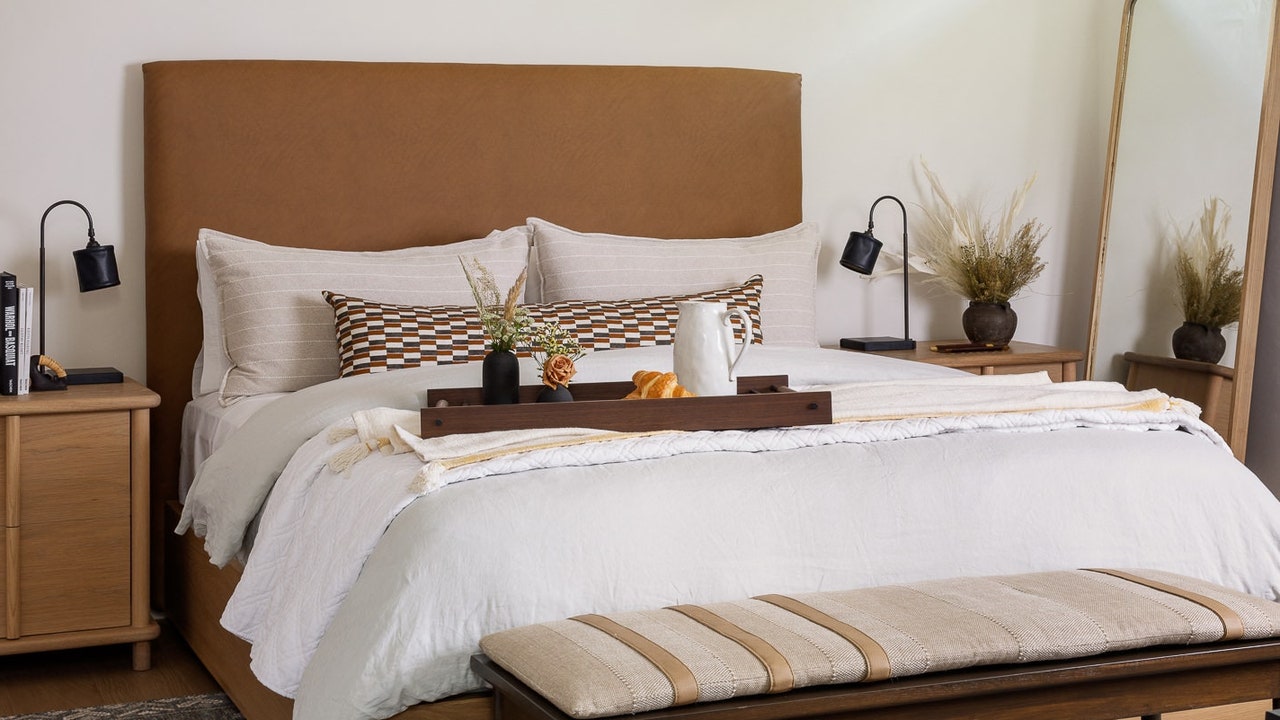We also review price, trial period, warranty, sustainability practices, materials, business ethics, and more. Finally, our team consults a network of sleep experts that includes physical therapists, doctors, psychologists, and other medical professionals to confirm any medical claims. From there, we share our findings to help you find the queen size mattress that’s best for you.
For a full rundown of our mattress testing process (and to discover how much we nerd out on sleep technology), check out our full sleep product testing methodology.
What Are the Different Kinds of Queen Size Mattresses?
Deciding on the right size mattress is tough enough, but the options don’t stop there. Mattresses vary in material and composition, with the goal of creating a certain sleeping experience. While there are many types of queen size mattresses, these might be the most recognizable.
All-Foam
All-foam mattresses often consist of memory foam, polyfoam, and gel-infused layers, with no coils or springs. These mattresses typically contour to the body, offering pressure relief and plush comfort. They often isolate motion well and create a hugging sensation because of their density. However, foam tends to retain heat, so this mattress type might not be ideal for hot sleepers.
Latex
Latex mattresses are derived synthetically or naturally and create a buoyant, cooling experience that boosts mattress responsiveness. Natural latex mattresses often run expensive, but can help prevent dust mites, mold, and other allergens. However, these are not a good option for individuals with a latex allergy.
Hybrid
Hybrid mattresses combine innerspring and foam layers for a supportive, soft feel. It’s a best-of-both-worlds situation for sleepers who share a bed or want versatile comfort levels. Hybrids typically regulate temperature fairly well with the spring and foam combination.
Innerspring
When you think of a traditional mattress, an innerspring probably comes to mind. Innerspring mattresses use a foundation of springs and coils, surrounded by cushioned materials for comfort. They are typically durable and provide firm pressure.
What You Should Look for in a Queen Size Mattress
No mattress is created equal. Considering how humans spend approximately one-third of their lives in bed, it’s important to invest in a quality mattress. Here are some key qualities to keep in mind when buying a new queen mattress.
Mattress Type
The best type of queen size mattress is subjective to the sleeper, says Wendy Troxel, PhD, a senior behavioral scientist at the RAND Corporation and a licensed clinical psychologist. Individuals who want a softer experience or who have joint pain might consider a foam mattress since it molds to your body. Meanwhile, people with back pain or who need firmer support might look at an innerspring or coil mattress.
Materials
Materials and mattress types go hand-in-hand. Again, the optimal mattress material depends on each person’s goal. In hybrids, for example, the stability of coils paired with cushiony foam can help prevent motion transfer, says Dr. Troxel. If eco-friendly materials are important for your purchase, take a look at the fine print to see how different mattresses are sourced and manufactured.
Firmness
Mattresses are commonly classified as soft, medium, or firm, but also come in combinations like medium-soft or medium-firm. As with most mattress-related qualities, desired firmness varies by person. “For instance, if you’re having back issues, a more firm mattress would probably be better to support the spine and the neck,” says Dr. Troxel. “But some people prefer a softer mattress for added comfort.”
Motion Control
Motion control refers to the degree to which motion transfer is felt across the bed, explains Dr. Troxel. Some mattresses might include added padding or support to help with motion control, which couples or individuals who share a bed with a pet might find useful.
Cooling
Temperature regulation can be an important factor for comfortable rest, especially if you find yourself kicking the covers off at night. Many mattresses include cooling features, but it’s important to keep an eye on the material. “Foam mattresses, for example, might be less preferred for people who run hot because they tend to trap heat,” notes Dr. Troxel.
Price
It’s no secret: Mattresses aren’t cheap. Dr. Troxel recommends looking at this purchase like an investment, considering how much time we spend in bed or asleep. Generous return policies are also critical for determining the right fit, says Dr. Troxel. “Going into a mattress store or spending one or two nights on a mattress in your home is not going to tell you how the mattress will work in the long term,” she notes.
FAQs
What is a good price for a queen mattress?
The right price for a mattress depends on your budget, but queen size mattresses typically range between $1,000 to $2,000. This number varies depending on materials and construction, with more luxury offerings (like cooling layers and enhanced pressure-relieving support) inching the price closer to the $2,000 mark and above.
How tall should a queen mattress be?
Queen mattresses are typically 10 to 12 inches tall, but some can reach up to 16 inches or taller. Mattress thickness comes down to personal preferences, with thicker mattresses often providing more support and comfort.
What is the difference between a queen and a king mattress
The biggest difference between queen and king size mattresses comes down to size. King mattresses are 16 inches wider than queens and recommended for larger bedrooms. Because of the larger size, king beds are also more expensive, often totaling $2,000 or more.

